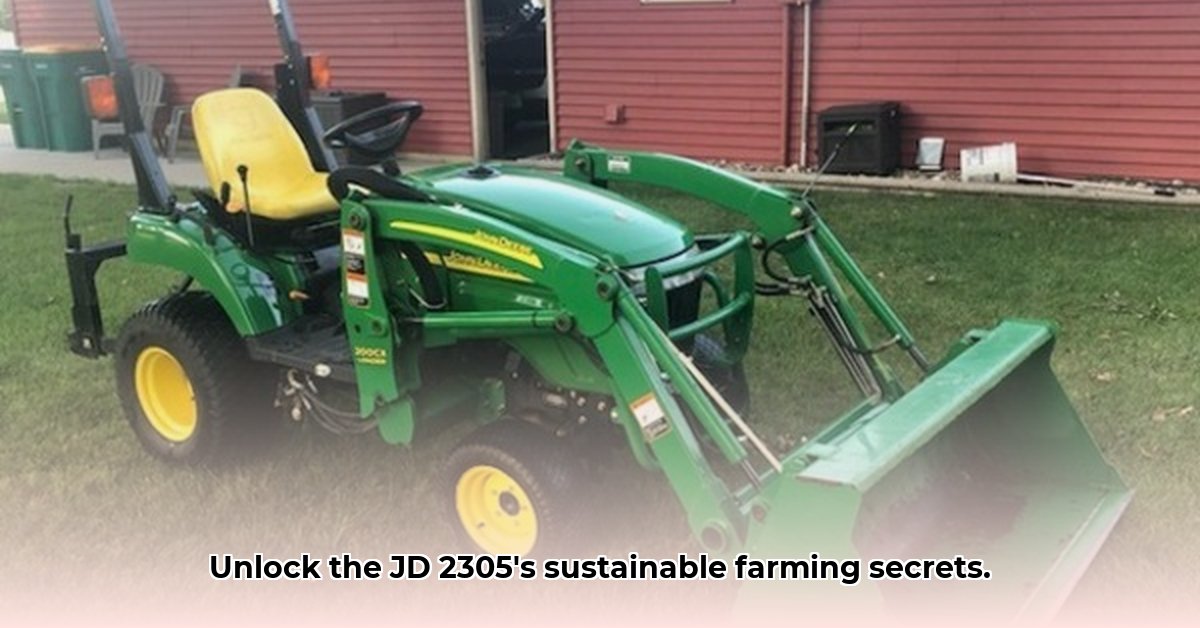
JD 2305 Tractor: Your Partner in Sustainable Farming
The John Deere 2305 tractor, while not explicitly featured in extensive published reviews regarding sustainable agriculture, offers a compelling pathway for environmentally conscious farming practices. Its compact size and likely fuel-efficient engine make it a strong candidate for maximizing efficiency and minimizing environmental impact. For more on John Deere tractors, see this detailed guide. This guide explores how its features, when coupled with sound agricultural techniques, contribute to sustainable farming.
Understanding the JD 2305's Role in a Greener Future
How can a compact tractor like the JD 2305 contribute to sustainable farming? Its smaller footprint directly reduces soil compaction, a crucial factor in maintaining soil health. Healthy soil is the bedrock of sustainable agriculture; minimizing compaction ensures stronger root systems, better water absorption, and ultimately, healthier crops that require less intervention. Reduced soil disturbance leads to a reduced carbon footprint and greater farm resilience. Doesn't this sound like a win-win situation?
This focus on sustainability translates directly into cost savings. Compact tractors typically boast better fuel efficiency, significantly reducing operational expenses and decreasing the overall carbon footprint of the operation. Imagine the financial relief of decreased fuel costs and a more sustainable farming operation.
Fuel Smarts: Maximizing Efficiency, Minimizing Waste
Optimal fuel utilization is critical for both profitability and environmental responsibility. The JD 2305, mirroring John Deere's commitment to efficiency in its other models, likely incorporates engine technologies designed for reduced fuel consumption. But let’s not just leave it to the technology. You can take the reins and further optimize fuel efficiency.
Actionable Steps:
- Regular Maintenance: Schedule regular servicing (following the manufacturer's recommendations) to ensure the engine operates at peak efficiency. This proactive approach prevents unnecessary fuel waste due to mechanical inefficiencies.
- Tire Inflation: Maintaining correct tire pressure is essential. Under-inflated tires increase rolling resistance, leading to increased fuel consumption. Proper inflation significantly improves fuel economy and traction.
- Minimize Idling: Avoid unnecessary idling. Idling consumes fuel without contributing to productive work. Only idle when absolutely necessary.
Precision Farming: Doing More with Less
Precision agriculture is the cornerstone of sustainable farming. The JD 2305 is ideally suited for integration with precision technologies like GPS-guided implements. Imagine the potential: precise planting maximizes seed density while minimizing waste, targeted fertilizer application avoids runoff and maximizes nutrient uptake. These precision farming methods significantly improve agricultural efficiency and sustainability.
Actionable Steps:
- GPS-Guided Seeding: Employ GPS-guided seeding to ensure uniform seed spacing and depth, leading to optimal germination and yield.
- Variable-Rate Application: Utilize variable-rate technology for fertilizer and pesticide application, ensuring inputs are precisely distributed where needed, avoiding unnecessary waste.
Practical Steps to Sustainable Farming with Your JD 2305
Let’s translate theory into practice. Here’s a concise, actionable plan for maximizing your JD 2305's contribution to sustainable farming:
- Regular Maintenance: Schedule preventative maintenance to prevent costly repairs and ensure optimal fuel efficiency. (target goal: reduce downtime by 15%)
- Implement Selection: Choose implements designed for minimum tillage or no-till methods, preserving soil structure and reducing erosion.
- Precision Application: Integrate GPS guidance and variable-rate technology for fertilizer and pesticide application for efficiency. (aim for a 10% reduction in input costs)
- Fuel Monitoring: Track fuel consumption to identify areas for improvement and refine operational strategies.
- Soil Health Practices: Complement your tractor’s work with practices that improve soil health, such as cover cropping and crop rotation.
Weighing the Pros and Cons
While the JD 2305 offers many advantages, a balanced perspective is necessary.
| Advantages | Considerations |
|---|---|
| Fuel Efficiency | Higher initial investment compared to older models |
| Reduced Soil Compaction | Requires operator expertise in precision farming techniques |
| Precision Agriculture Capability | Ongoing maintenance and technological upgrades may be required |
The Future of Sustainable Farming: Embracing the JD 2305
The JD 2305, while lacking extensive published case studies in sustainable farming, holds significant promise. By focusing on fuel efficiency, incorporating precision agriculture techniques, and prioritizing soil health, farmers can significantly improve the environmental sustainability and economic viability of their operation. Investing in this technology represents a commitment to a future-proof, sustainable farming practice. The journey towards sustainability is ongoing; embrace the opportunities presented by the JD 2305.